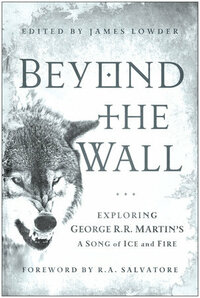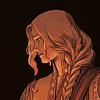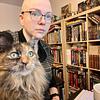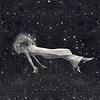Take a photo of a barcode or cover
30 reviews for:
Beyond the Wall: Exploring George R. R. Martin's A Song of Ice and Fire
James Lowder
30 reviews for:
Beyond the Wall: Exploring George R. R. Martin's A Song of Ice and Fire
James Lowder
This was a really interesting compendium of essays on Martin's A Song of Ice and Fire series. As with any collection of essays, some were better than others, and some appealed more to me than others. My favourite chapters included Alyssa Rosenburg's examination of the use of rape as a war weapon in the series; the character study of Littlefinger through the lens of psychopathy; and Whitehead's chapter on the uncertain history of Westeros. The chapters on religion, magic, the Dunk and Egg prequels and PTSD were also highlights.
I sadly enough did not terribly enjoy the chapter on feminism; while there were some interesting insights, the author did not seem to see the nuances in some of the character arcs she was examining, and her disdain for Sansa was unforgivable as far as I am concerned. One of the real surprises was the chapter on the graphic novel adaptation, which explored many of the issues of translating a book series into a visual format. Ultimately I really enjoyed this compendium, even more so than the Blackwell Pop Culture and Philosophy volume; the fact that this was written by bloggers and authors rather than academics seems to have freed it of its Philosophy 101 feel and ungraceful shoehorning of the books into a philosophical essay. I'm really looking forward to the doubtless numerous volumes of this sort that will emerge after the series has ended, since these current essays are inevitably hindered by the lack of closure in the books.
3.5/5 stars.
I sadly enough did not terribly enjoy the chapter on feminism; while there were some interesting insights, the author did not seem to see the nuances in some of the character arcs she was examining, and her disdain for Sansa was unforgivable as far as I am concerned. One of the real surprises was the chapter on the graphic novel adaptation, which explored many of the issues of translating a book series into a visual format. Ultimately I really enjoyed this compendium, even more so than the Blackwell Pop Culture and Philosophy volume; the fact that this was written by bloggers and authors rather than academics seems to have freed it of its Philosophy 101 feel and ungraceful shoehorning of the books into a philosophical essay. I'm really looking forward to the doubtless numerous volumes of this sort that will emerge after the series has ended, since these current essays are inevitably hindered by the lack of closure in the books.
3.5/5 stars.
Some essays were much better than others but overall it added to my rereading experience and made me think
Un compendio de ensayos y artículos sobre el universo de Poniente creado por [a:George R. R. Martin|19120077|George R. R. Martin|https://s.gr-assets.com/assets/nophoto/user/u_50x66-632230dc9882b4352d753eedf9396530.png]. Hay algunos muy interesantes, aunque supongo que dependerá como siempre de las inquietudes e intereses del lector. Me han llamado especialmente la atención el de [a:Alyssa Rosenberg|5813078|Alyssa Rosenberg|https://s.gr-assets.com/assets/nophoto/user/u_50x66-632230dc9882b4352d753eedf9396530.png] sobre la violencia en Canción de Hielo y Fuego. Un artículo duro sobre las violaciones y las caídas de los mitos. O el de [a:Myke Cole|804399|Myke Cole|https://images.gr-assets.com/authors/1439857990p2/804399.jpg], sobre el trastorno por estrés postraumático en Canción de Hielo y Fuego, centrando su atención sobre los personajes de Arya Stark y Theon Greyjoy. Muy bien documentado y con testimonios reales sobre el efecto de la guerra en las personas.
En fin, una lectura rápida y amena en general que ensalza aún más la obra de Martin, teniendo en cuenta que los artículos se escribieron entre 2011 y 2012 con [b:Danza de dragones|15761880|Danza de dragones (Canción de Hielo y Fuego, #5)|George R.R. Martin|https://images.gr-assets.com/books/1373484071s/15761880.jpg|2936175] recién publicado y que nada nuevo ha salido desde entonces, salvo el avance de la serie televisiva que concluye este año.
Desde aquí mi apuesta personal a que en navidades se publica "Vientos de invierno" aprovechando el fin de la serie y el ansia de los fans por seguir devorando "Tronos". ¡Maldito don Dinero!
En fin, una lectura rápida y amena en general que ensalza aún más la obra de Martin, teniendo en cuenta que los artículos se escribieron entre 2011 y 2012 con [b:Danza de dragones|15761880|Danza de dragones (Canción de Hielo y Fuego, #5)|George R.R. Martin|https://images.gr-assets.com/books/1373484071s/15761880.jpg|2936175] recién publicado y que nada nuevo ha salido desde entonces, salvo el avance de la serie televisiva que concluye este año.
Desde aquí mi apuesta personal a que en navidades se publica "Vientos de invierno" aprovechando el fin de la serie y el ansia de los fans por seguir devorando "Tronos". ¡Maldito don Dinero!
Beyond the Wall is a collection of essays looking at A Song of Ice and Fire (Game of Thrones) from a variety of angles.
I definitely appreciated Brent Hartinger’s article on the “role of freaks and outcasts” in the series. Hartinger argues, I think fairly, that Martin has created a significant number of underdog characters who “violate major gender or social norms” and are not stereotyped (examples include Tyrion, Aria, Jon, Bran, Samwell, Brienne, and Catelyn). I thought it was interesting how Hartinger draws a distinction between these outsiders and the more traditional fantasy outsiders like Luke Skywalker or Harry Potter who are (usually white) men called to greatness.
Specifically referencing the violence against women in the books, Hartinger presents both the argument that the violence is too overwhelming as well as the counterargument that Martin is using the scale of the violence to show women as “the ultimate outsiders”.
I was also interested in Caroline Spector's article, “Power and Feminism in Westeros”. As in the panel, Spector makes the case that the challenges and violence the women characters in GoT experience are part of Martin’s attempt to show the hypocrisy of Westeros culture and the breakdown of social order. Spector goes through some of the notable women characters to talk about how they gain and lose power through the novels. She concludes:
I can’t say I agree on that point. I appreciate the nuanced women characters in GoT but I think if there is that bigger social feminist meaning intended by Martin, it probably goes over the heads of most of the readers.
In terms of the rest of the collection, there were some other really interesting takes, including an analysis of how Martin’s novels reflect Romanticism and a piece on Martin’s very careful use of magical and supernatural elements in the books. Less interesting to me were the pop-psychology articles analyzing the GoT characters and whether or not they could be said to have PTSD (Theon and Arya) or sociopathy (Littlefinger).
The other piece directly relating to violence against women came from Alyssa Rosenberg of Think Progress and The Atlantic. Rosenberg tends to agree with Spector that the violence serves a larger purpose to denote “monsters” among the characters as well as corruption and breakdown in social structures in certain regions and classes. However, Rosenberg acknowledges that some readers may find the number of assaults depicted to be “an insurmountable barrier to enjoying the books or the show”
However, the fact that the series is still unfinished means Spector may end up being proved right. As Lowder points out in his intro to the collection, it’s difficult to do a full analysis when there are still books to be written and published.
I definitely appreciated Brent Hartinger’s article on the “role of freaks and outcasts” in the series. Hartinger argues, I think fairly, that Martin has created a significant number of underdog characters who “violate major gender or social norms” and are not stereotyped (examples include Tyrion, Aria, Jon, Bran, Samwell, Brienne, and Catelyn). I thought it was interesting how Hartinger draws a distinction between these outsiders and the more traditional fantasy outsiders like Luke Skywalker or Harry Potter who are (usually white) men called to greatness.
Specifically referencing the violence against women in the books, Hartinger presents both the argument that the violence is too overwhelming as well as the counterargument that Martin is using the scale of the violence to show women as “the ultimate outsiders”.
I was also interested in Caroline Spector's article, “Power and Feminism in Westeros”. As in the panel, Spector makes the case that the challenges and violence the women characters in GoT experience are part of Martin’s attempt to show the hypocrisy of Westeros culture and the breakdown of social order. Spector goes through some of the notable women characters to talk about how they gain and lose power through the novels. She concludes:
“In the midst of what appears to be a traditional male-power fantasy about war and politics, he serves up a grim, realistic, and harrowing depiction of what happens when women aren’t fully empowered in a society. In doing so…Martin has created a subversively feminist tale.”
I can’t say I agree on that point. I appreciate the nuanced women characters in GoT but I think if there is that bigger social feminist meaning intended by Martin, it probably goes over the heads of most of the readers.
In terms of the rest of the collection, there were some other really interesting takes, including an analysis of how Martin’s novels reflect Romanticism and a piece on Martin’s very careful use of magical and supernatural elements in the books. Less interesting to me were the pop-psychology articles analyzing the GoT characters and whether or not they could be said to have PTSD (Theon and Arya) or sociopathy (Littlefinger).
The other piece directly relating to violence against women came from Alyssa Rosenberg of Think Progress and The Atlantic. Rosenberg tends to agree with Spector that the violence serves a larger purpose to denote “monsters” among the characters as well as corruption and breakdown in social structures in certain regions and classes. However, Rosenberg acknowledges that some readers may find the number of assaults depicted to be “an insurmountable barrier to enjoying the books or the show”
However, the fact that the series is still unfinished means Spector may end up being proved right. As Lowder points out in his intro to the collection, it’s difficult to do a full analysis when there are still books to be written and published.
A collection of essays that rip apart Game of Thrones series to within an inch of it's life. Meh. It was OK, but I prefer just the magic of the stories without all of the analysis.
I was interested by this book when I first saw it and then when it was listed for under 3 bucks as a Kindle edition I went for it. Take this book at face value, it's fans and bloggers looking at the series as a whole and chatting about it. Scholarly research it is not. But what this is essentially is paramount to buddies sitting on the couch and talking about books they dig. Chock full of spoilers and conjecture this book digs into the series and discusses a lot of cool ideas: romanticism, feminism, and Post traumatic syndrome. It discusses the Dunk and Egg stories and really digs into one of the greater mysteries of the series... Jon Snow's parentage. This is a worthwhile read if you like the series but if you frequent the online forums there is nothing new here. Also, the essay about collecting the paper books fell flat for me. Otherwise this book was a lot of fun and a fast read.
Si te gusta la obra de Martin algunos de estos ensayos te parecerá interesante pero en general puedes encontrar en la red muchísimos mejores ensayos. La ventaja es que estos de aquí los tienes todos juntitos y traducidos.
Beyond the Wall is a good educational companion to George R.R. Martin's A Song of Ice and Fire series. It's a compilation of different essays written about different subject matters relating to the books. I personally found R.A. Salvatore's foreward fascinating, as well as, Alyssa Rosenberg's essay about the sexual politics in the series. I also found the Westeros.org founders' essay about romanticism really interesting and talked about it with my husband (who has also read the books). The essays are a great starting point for discussion for all SoI&F fans.
Thank you to NetGalley and BenBella Books, Inc for the galley!
Thank you to NetGalley and BenBella Books, Inc for the galley!
An interesting, though rather uneven read; certain essays are significantly better both in terms of the quality of writing and their tackling of the chosen subject. Nevertheless enjoyed the book overall, its contents and surprises (I did not expect to read an essay on the matter of editions collecting)
An interesting collection of essays about A Song of Ice and Fire.
My favourites included:
An Unreliable World by Adam Whitehead
Back to the Egg by Gary Westfahl
Petyr Baelish and the Mask of Sanity by Matt Staggs
My favourites included:
An Unreliable World by Adam Whitehead
Back to the Egg by Gary Westfahl
Petyr Baelish and the Mask of Sanity by Matt Staggs







